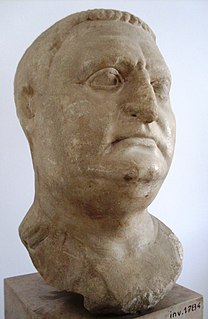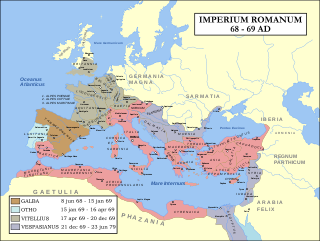Related Research Articles

Aulus Vitellius was Roman emperor for eight months, from 19 April to 20 December AD 69. Vitellius was proclaimed emperor following the quick succession of the previous emperors Galba and Otho, in a year of civil war known as the Year of the Four Emperors. Vitellius was the first to add the honorific cognomen Germanicus to his name instead of Caesar upon his accession. Like his direct predecessor, Otho, Vitellius attempted to rally public support to his cause by honoring and imitating Nero who remained widely popular in the empire.

Vespasian was a Roman emperor who reigned from AD 69 to 79. The fourth and last emperor who reigned in the Year of the Four Emperors, he founded the Flavian dynasty that ruled the Empire for 27 years. His fiscal reforms and consolidation of the empire generated political stability and a vast Roman building program.

AD 69 (LXIX) was a common year starting on Sunday of the Julian calendar. At the time, it was known as the Year of the Consulship of Augustus and Rufinus. The denomination AD 69 for this year has been used since the early medieval period, when the Anno Domini calendar era became the prevalent method in Europe for naming years.

Legio XXI Rapax was a legion of the Imperial Roman army. It was founded in 31 BC by the emperor Augustus, probably from men previously enlisted in other legions. The XXI Rapax was destroyed in 92 by the Sarmatians. The symbol of the legion is thought to have been a capricorn.

The Revolt of the Batavi took place in the Roman province of Germania Inferior between AD 69 and 70. It was an uprising against the Roman Empire started by the Batavi, a small but militarily powerful Germanic tribe that inhabited Batavia, on the delta of the river Rhine. They were soon joined by the Celtic tribes from Gallia Belgica and some Germanic tribes.

The Year of the Four Emperors, AD 69, was the first civil war of the Roman Empire, during which four emperors ruled in succession: Galba, Otho, Vitellius, and Vespasian. It is considered an important interval, marking the transition from the Julio-Claudians, the first imperial dynasty, to the Flavian dynasty. The period witnessed several rebellions and claimants, with shifting allegiances and widespread turmoil in Rome and the provinces.

Legio III Gallica was a legion of the Imperial Roman army. The cognomen Gallica suggests that its earliest recruits came from veterans of the Gallic legions of Gaius Julius Caesar, a supposition supported by its emblem, a bull, a symbol associated with Caesar. The legion was based for most of its existence at Raphanea, Roman Syria, and was still active in Egypt in the early 4th century.

Marcus Antonius Primus was a senator and general of the Roman Empire.
Gaius Licinius Mucianus was a Roman general, statesman and writer. He is considered to have played a role behind the scenes in the elevation of Vespasian to the throne.
The Battle of Bedriacum refers to two battles fought during the Year of the Four Emperors near the village of Bedriacum, about 35 kilometers (22 mi) from the town of Cremona in northern Italy. The fighting in fact took place between Bedriacum and Cremona, and the battles are sometimes called "First Cremona" and "Second Cremona".

Legio VII Claudia was a legion of the Imperial Roman army.
Titus Flavius T. f. T. n. Sabinus was a Roman politician and soldier. A native of Reate, he was the elder son of Titus Flavius Sabinus and Vespasia Polla, and brother of the Emperor Vespasian.
Cornelius Fuscus was a Roman general who fought campaigns under the Emperors of the Flavian dynasty. During the reign of Domitian, he served as prefect of the imperial bodyguard, known as the Praetorian Guard, from 81 until his death in 86 AD. Prior to this appointment, Fuscus had distinguished himself as one of Vespasian's most ardent supporters during the civil war of 69 AD, known as the Year of the Four Emperors.
Marcus Arrecinus Clemens, was a prefect of the Praetorian Guard during the reign of Vespasian. In return for his faithful service, Clemens was promoted to other important positions, including being twice consul and urban prefect of Rome.
The gens Vitellia was a family of ancient Rome, which rose from obscurity in imperial times, and briefly held the Empire itself in AD 69. The first of this gens to obtain the consulship was Aulus Vitellius, uncle of the emperor Vitellius, in AD 32.
Julius Classicus was a Gaulish nobleman and military commander of the 1st century AD, belonging to the tribe of the Treviri. He served as a commander of the Roman auxiliaries. Along with Julius Tutor, another Treviran Roman auxiliary commander, and Julius Sabinus, who claimed descent from Gaius Julius Caesar, he joined the rebellion of Gaius Julius Civilis during the disorder of the Year of the Four Emperors.
Fabius Valens of Anagnia was a Roman commander favoured by Nero. Valens was an undisciplined character but not without talent; he tried to portay himself as witty by behaving frivilously.
Gaius Dillius Aponianus was a Roman senator and general, who played a role in the Year of Four Emperors. Aponianus ended up supporting Vespasian, and as a reward he was appointed suffect consul during the early years of that emperor.
Marcus Aponius Saturninus was a Senator of Imperial Rome who was the child of wealthy senatorial parents, who owned property in Egypt. He is mentioned in the Acta Arvalia in the year 57 AD; classicist Ronald Syme suggests that he was made a member of the Arval Brethren due to the influence of Annaeus Seneca. Saturninus is mentioned as being present in 66 for sacrifices on the Capitol with the emperor Nero. Tacitus calls him a consul, but the date of his office is uncertain. He may have been consul in 55; Classical scholar Paul Gallivan at the University of Tasmania has argued that Saturninus was suffect consul between 63 and 66, by which time he was recorded as becoming promagister.
References
- 1 2 3 Tacitus, Historiae, iii.6
- ↑ Tacitus, Annales , xiii.9
- 1 2 3 Tacitus, Historiae, iv.39
- ↑ Tacitus, Historiae, iii.16
- ↑ Tacitus, Historiae, iii.17
- ↑ Tacitus, Historiae, iii.61
- 1 2 Tacitus, Historiae, iv.2
- 1 2 Tacitus, Historiae, iv.68
- ↑ Morgan, 69 A.D. The Year of Four Emperors (Oxford: University Press, 2006), p. 256
- ↑ Morgan, 69 A.D., p. 257
- ↑ d'Escurac, La préfecture de l'annone, service administratif impérial d'Auguste à Constantin (Bibliothèque des Écoles françaises d'Athènes et de Rome, 226) (Rome: Ecole française de Rome, 1976), p. 323
- ↑ Morgan, 69 A.D., p. 268